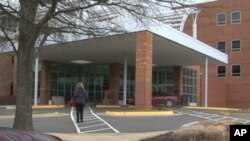As Republican and Democratic Party lawmakers met in Washington for a White House summit on healthcare reform, VOA looked at what reform could mean for American hospitals. Many are in deep financial trouble. About half are currently operating at a deficit. The CEO of a hospital in one small town, Warrenton, Virginia, discussed the problems he faces and the fixes he would like to see.
Roger Baker is president of Fauquier Hospital, a small facility about an hour from Washington. Like many hospital CEO's across the country, Baker says revenues are declining while operating costs are rising. He wants Washington to come up with a solution. "I think that we and many others really want meaningful reform. The system I think in the long run is not sustainable," he said.
Fauquier Hospital serves the residents of Warrenton, Virginia and surrounding Fauquier County.
The area has weathered the recession better than other parts of the country, but the community is feeling the pinch.
Although Fauquier Hospital is non-profit, it relies on earnings over and above operating costs to maintain its facilities. It earned 2.6 percent over costs last year, a figure Baker says is unsustainable. "You needed about a five percent operating margin in order to stay in business over the long haul, especially if you are in a community like this that is growing and you have to invest in new facilities from time to time, recruit new physicians to the area and hire staff," he said.
Baker says the economy is part of the problem. People are putting off non-essential procedures.
The number of procedures at the hospital is down ten percent so far this year.
But the number of uninsured patients is also rising, currently at eight percent of all patients. That costs the hospital about 6 million dollars a year. "And the way that we make up the difference for what those uninsured patients cost in terms of the cost of their care, is that we have to utilize the excess of revenues over expenses or the profits we generate from patients who have insurance," Baker said.
And that causes a chain reaction, with fees rising for insured patients and insurance companies raising premiums on those they cover.
Fauquier Hospital is also bracing for cuts in payments from Medicaid, a government program that funds healthcare for the poor.
The proposed cuts could mean another five percent in revenue lost or about $5 million a year. "Well we would have to curtail services somehow. We have to figure out is there a service that we can shut down," he said.
Baker say the federal government can help hospitals like Fauquier by ensuring that as many people as possible are insured. That, he says, will bring down the cost of care. "There are other countries that are providing similar outcomes without spending as much money. And I think that our challenge and the country's challenge is to get to the point where we can afford the healthcare system that we have in our country," he said.
President Obama's current proposal calls for insuring 30 million more Americans at a cost of about $1 trillion over ten years. Republicans have a plan to insure three million more Americans at cost of $60 billion for the same period.




